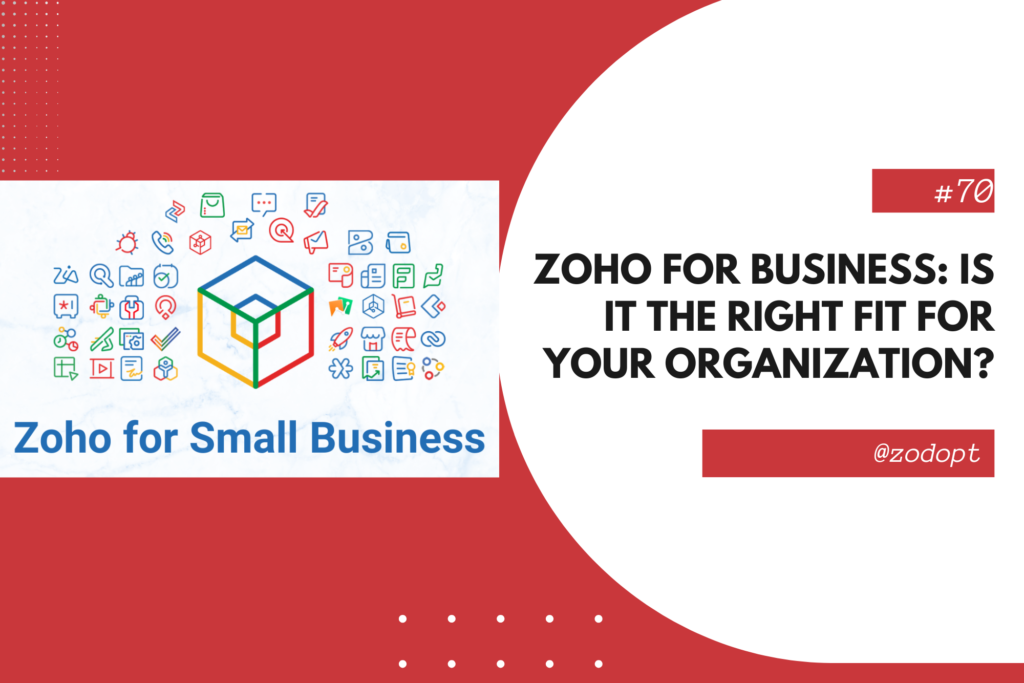Zoho for Business: Is It the Right Fit for Your Organization?
Introduction

Introduction: Why Consider Zoho for Your Business?
In today’s digital landscape, businesses rely on software solutions to streamline operations, enhance productivity, and improve customer experiences. Zoho for Business has gained immense popularity among startups, small businesses, and enterprises. However, is it the right fit for your organization?
This in-depth guide explores Zoho’s key features, benefits, pricing, use cases, and comparisons with competitors. By the end, you’ll have a clear understanding of whether Zoho aligns with your business needs.
Understanding Zoho for Business: What Makes It Unique?
1. Comprehensive Business Applications
Zoho provides over 50+ applications covering various business functions, including:
Sales & CRM: Zoho CRM, Bigin
Marketing: Zoho Marketing Hub, Zoho Social
Finance: Zoho Books, Zoho Expense, Zoho Payroll
Human Resources: Zoho People, Zoho Recruit
Operations & Productivity: Zoho Projects, Zoho WorkDrive
Customer Service: Zoho Desk, Zoho Assist
IT Management: Zoho Creator, Zoho Flow
2. Integration Capabilities
Zoho seamlessly integrates with Google Workspace, Microsoft 365, Slack, Trello, Shopify, QuickBooks, and more.
Additionally, it provides custom APIs for enterprise-level automation and system integration.
3. AI-Powered Insights
Zia AI automates workflows, predicts sales trends, and provides actionable business insights.
Key Benefits of Using Zoho for Business
1. Cost-Effectiveness
Zoho offers affordable subscription models tailored to businesses of all sizes.
Moreover, its transparent pricing ensures there are no hidden costs.
Free trials are available for most Zoho applications, allowing users to explore features before committing.
2. Scalability for Businesses of All Sizes
Startups can begin with essential tools and expand as they grow.
Meanwhile, large enterprises benefit from Zoho’s customization and automation capabilities.
3. Data Security & Compliance
GDPR, HIPAA, and SOC2 compliance ensures robust data security.
In addition, end-to-end encryption and two-factor authentication enhance protection.
With multiple data centers across the USA, EU, India, and Australia, Zoho supports global data sovereignty.
Zoho for Business: Detailed Application Breakdown
1. Zoho CRM: Boosting Sales and Customer Engagement
Pipeline Management: Track leads, opportunities, and customer interactions.
Automation: AI-driven workflow automation optimizes lead nurturing.
Omnichannel Communication: Supports email, social, live chat, and telephony integrations.
Analytics & Reports: Custom dashboards and predictive trend analysis.
2. Zoho Books: Accounting Made Simple
Automated Invoicing: Easily track payments and send reminders.
Tax Compliance: Supports GST, VAT, and other tax regulations.
Financial Reporting: Generate balance sheets, profit & loss statements, and expense reports.
3. Zoho People: HR & Employee Management
Attendance & Leave Tracking streamlines workforce management.
Payroll Processing ensures compliance and accurate compensation.
Performance Evaluations help with employee development and appraisals.
4. Zoho Desk: Enhancing Customer Support
Multi-channel Ticketing System simplifies customer issue management.
Live Chat & Chatbot Support improve response times.
Service Level Agreement (SLA) Tracking ensures timely resolutions.
Step-by-Step Guide to Implementing Zoho for Business
Step 1: Define Business Objectives
First, assess your organization’s current workflow and identify areas for improvement.
Then, determine which business processes Zoho can streamline.
Step 2: Select the Right Zoho Apps
Begin with essential tools and gradually incorporate additional features.
Furthermore, experiment with free trials to understand the software’s capabilities.
Step 3: Onboard Your Team
Provide training through Zoho Academy & documentation to facilitate adoption.
Additionally, establish user roles and permissions to enhance security and efficiency.
Step 4: Integrate with Existing Systems
Leverage Zoho Marketplace to incorporate pre-built integrations.
If necessary, utilize Zoho’s API for seamless connectivity with current systems.
Step 5: Automate Workflows
Utilize Zoho’s AI-driven automation to enhance operational efficiency.
Moreover, set up automated reminders and reporting to improve productivity.
Step 6: Track Performance & Optimize
Monitor key metrics using Zoho’s analytics and dashboards to measure success.
Finally, continuously refine processes based on performance insights.
Final Thoughts: Should You Choose Zoho for Business?
If you seek an affordable, scalable, and feature-rich business suite, Zoho for Business is an excellent choice. From CRM to finance, HR to project management, Zoho offers all the essential tools to grow and streamline operations.
Final Recommendation:
✅ Choose Zoho if you want a budget-friendly, all-in-one business solution. 🚀 Consider Alternatives if you require highly advanced AI automation or industry-specific features.
👉 Start a free Zoho trial today and explore its capabilities!
FAQs
Is Zoho good for small businesses?
Absolutely! Zoho provides affordable plans, scalability, and essential business tools.
Does Zoho integrate with existing software?
Yes! Zoho integrates with Google Workspace, Slack, Shopify, QuickBooks, and more.
How secure is Zoho?
Zoho follows GDPR, HIPAA, and SOC2 compliance, ensuring top-tier security.
Is there a free version of Zoho?
Yes, Zoho offers free plans with basic features and paid plans with advanced functionalities.
How does Zoho compare to Salesforce?
Zoho is more affordable and easier to use, whereas Salesforce provides more enterprise-grade automation.
Zoho Marketing Automation: Nurture Your Leads Effectively
AI Emails in Zoho CRM: Create with ChatGPT
Newsletter
Get Our Latest Updated
Connect
- #46/17 G V Plaza, 12th Main Road, 1st Block, Rajajinagar, Karnataka, Bangalore - 560010
- enquiry@zodopt.com
- +91 8647878785

Finally, a rental management software that combines both lease management and accounting tools! Looks like a solid fit for property management companies of any size.